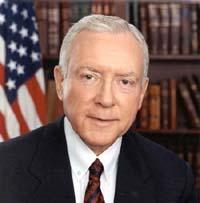 Presidential Privilege
Presidential PrivilegeYou win the White House, you make the judical nominations.
By Senator Orrin G. Hatch
The judicial-selection process must be fair, constructive, and consistent with constitutional principles. Yet less than two weeks after Justice Sandra Day O'Connor announced her retirement, and before President Bush has even chosen a nominee, we already see some disturbing signs that could threaten both the Senate's integrity and the judiciary's independence.
The Constitution has established a judicial-selection process by clearly assigning separate roles for the president and the Senate, giving authority to nominate and appoint judges to the president. Some senators and left-wing groups, apparently unwilling to accept that elections have consequences, seem to accept this arrangement only when it produces judges they like. If not, they prefer to talk about alternative arrangements that they either make up out of thin air or that the Constitutional Convention rejected.
We are, however, governed not by principles America's founders rejected, but by those they enshrined in the Constitution. If reading Article II, Section 2, of the Constitution is not clear enough, Alexander Hamilton reminds us in Federalist No. 65 that "in the business of appointments the executive will be the principal agent."
After the president nominates, the Senate has a role of "advice and consent" as a check on a nominee's final appointment. Perhaps the best way to understand this phrase is that the Senate gives its "advice" about whether the President should appoint someone by giving or withholding its "consent." In Federalist No. 66, Hamilton again clarifies that senators "cannot themselves choose" nominees, but "can only ratify or reject the choice of the president." Traditionally, the Senate has done so through up or down votes.
Some senators and their left-wing allies are trying to change this constitutional arrangement. In absolute contradiction to the Constitution's plain text and the Founders' clear intent, they claim that the Senate has an independent, co-equal role in picking judges. They separate "advice" from "consent," applying the former to nomination and the latter to confirmation.
The fact that the president and the Senate each has a role, however, does not make those roles co-equal. The Founders' view that the president is the "principal agent" and this new theory that the president and Senate are "co-equal partners" cannot both be true. The purpose of this novel theory is obvious, and it is to change the Constitution's assignment of judicial selection roles in order to appoint different judges. As Senator Edward Kennedy said on the Senate floor on July 12, the consultation Democrats demand "is more than a process, it's about an outcome." That outcome is a "consensus" nominee who will win "widespread bipartisan support," whether or not it is whom the president wants to appoint.
In other words, this scheme aims at forcing the president who did win the election to nominate someone acceptable to his opponents who did not. It seeks to turn consultation into co-nomination. Not content to exercise the role the Constitution does assign to the Senate by vigorously debating and then voting on a nominee, these senators and their left-wing enablers want to create a role the Constitution does not assign to the Senate, by manipulating the president's choice of a nominee.
This invented arrangement may serve their political agenda, but it is radically different from what the Constitution prescribes. Especially where the judicial branch is concerned, we should prefer the Constitution over politics. And the Constitution allows the President to decide how best to fulfill his constitutional responsibility of nomination.
Those who cannot justify their actions on the merits often retreat to saying "they did it too."
Those trying to justify filibusters of majority supported judicial nominations, for example, claimed Republicans had done the same. That, of course, completely re-defining what a filibuster is, but that is what happens in the absence of a persuasive argument. And today, some senators try to say that their demand for pre-nomination consultation producing consensus nominees is no different than what happened in the 1990s, when the partisan roles were reversed.
In 1993, President Clinton sought my input when considering a replacement for the retiring Justice Byron White. Some senators are today fond of waving my book Square Peg, in which I described cautioning President Clinton that confirming some candidates he was considering, such as then-Interior Secretary Bruce Babbitt, would be difficult. President Clinton instead nominated Ruth Bader Ginsburg, and she was easily confirmed.
President Clinton sought my input without my demanding it because he believed it would help him fulfill his constitutional responsibility for making judicial nominations. He did so not because Senate Republicans threatened filibusters or demanded some kind of veto power over his nominations. We did not try to impose a "consensus" standard or insist that a nominee meet some super-majority "widespread support" threshold.
Instead, President Clinton sought my input because I had established a cooperative relationship with him, because he knew his nominees would be treated fairly. Senators demanding consultation and threatening filibusters today might instead consider taking the same approach. Perhaps earning consultation will work better than demanding it.
While I appreciate publicity for my book, I have yet to hear a Democratic senator who holds it up also quote from page 126, where I write: "One of the consequences of a presidential election...is that the winner has the right to appoint nominees to the court." In fact, at the same time I was giving President Clinton the input he sought, I also said on the Senate floor: "The President won the election. He ought to have the right to appoint the judges he wants to." Some who today demand consultation appear to have rejected that notion altogether.
In the end, the constitutional principle is simple. The president, not the Senate, makes judicial nominations. The Senate's role is a check on appointment, not a veto on nomination. Every president must decide for himself what will help him fulfill his constitutional responsibility. President Bush has chosen to reach out to more than 60 senators for input, including more than half of the Democratic Caucus and every member of the Judiciary Committee. Such consultation, as well as his eventual nomination, are his choice.
Shortly after President Bush took office in 2001, the Senate Democratic leadership vowed to use "whatever means necessary" to defeat undesirable judicial nominees. That spring, Democrats huddled with left-wing strategists to "change the ground rules" for the judicial-confirmation process. The filibusters that followed and the current demand for "consultation" and "consensus" nominees is part of that strategy. As Senator Kennedy put it, this is not about a fair process but a desirable outcome. The Senate's integrity and the judiciary's independence, however, requires rejecting political gimmicks and sticking with constitutional principle.
— The Honorable Orrin G. Hatch is a Republican senator to the United States Senate from Utah. Senator Hatch is former chairman of the Senate Judiciary Committee.


0 Comments:
Post a Comment
<< Home